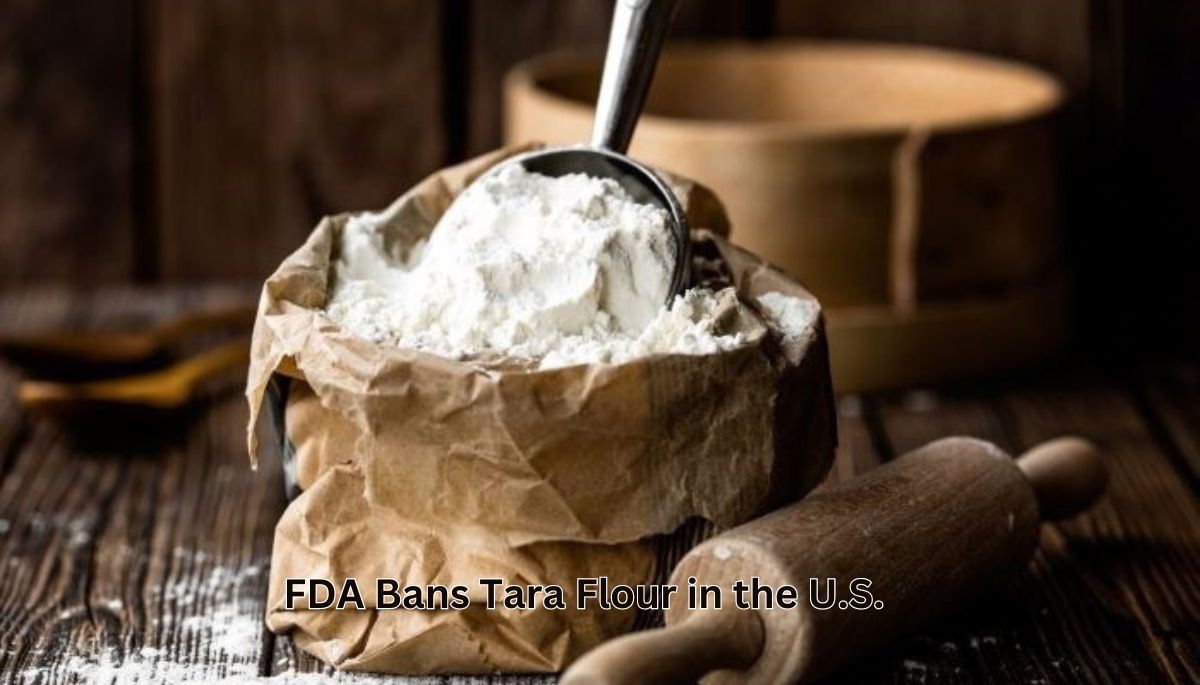In May 2024, the U.S. Food and Drug Administration (FDA) made a significant move by declaring tara flour as unsafe. This ruling came two years after a troubling outbreak linked to tara flour, a once-prominent ingredient in alternative food products. Tara flour, derived from the seeds of the tara tree, had gained popularity for its use in vegan and gluten-free foods. However, the FDA’s investigation has unveiled serious health risks associated with this ingredient, leading to a permanent ban on its use in the U.S. food market.
What Is Tara Flour
Tara flour is a powdered food additive made from the seeds of the Caesalpinia spinosa, commonly known as the tara tree. This tree is native to Peru and parts of South America. Traditionally, the seeds of the tara tree were utilized for industrial purposes, such as tanning leather. However, in recent years, tara flour found its way into the health food sector, where it was marketed as a natural and sustainable alternative ingredient for plant-based diets.
Tara flour is high in protein and fiber, and it was promoted for its ability to improve the texture of gluten-free baked goods. Despite these benefits, the ingredient has now been linked to significant health hazards.
Health Concerns Linked to Tara Flour
The ban on tara flour was preceded by a series of illness outbreaks in 2021 and 2022, which were traced back to products containing this additive. Reports indicated that consumers experienced severe gastrointestinal distress, including vomiting, diarrhea, and abdominal pain, after consuming foods with tara flour. The FDA’s investigation into these cases revealed that the flour had not undergone adequate safety testing prior to its use in U.S. markets. As a result, the FDA concluded that tara flour posed an unacceptable risk to public health.
One of the most alarming aspects of the FDA’s findings was that tara flour contains unapproved additives, which can cause allergic reactions and other adverse health effects. These contaminants were present due to improper manufacturing and handling processes, leading to the ingredient being deemed unsafe for consumption.
Why the FDA Banned Tara Flour
In the aftermath of the outbreaks, the FDA launched a comprehensive investigation into the safety of tara flour. This investigation revealed several regulatory violations, including the fact that tara flour had been used without prior approval as a food additive. Under U.S. law, any new food ingredient must go through a rigorous review and approval process to ensure it meets safety standards. However, manufacturers of tara flour had bypassed this step, bringing the ingredient into the market without the necessary safety assessments.
Additionally, the FDA found that the chemical composition of tara flour varies significantly between batches, making it difficult to standardize its safety for human consumption. This inconsistency raised further concerns about the potential for unforeseen adverse reactions.
The Impact of the Tara Flour Ban
The FDA’s ban on tara flour has had far-reaching consequences for both food manufacturers and consumers. Many companies that had incorporated tara flour into their products, especially in the vegan and gluten-free sectors, have had to recall products and reformulate recipes. For consumers, the ban has served as a stark reminder of the importance of food safety regulations and the potential risks of consuming unapproved food additives.
For manufacturers, the sudden removal of tara flour from the market has disrupted supply chains, leading to significant financial losses. Companies that had invested in the development of tara flour-based products are now forced to find alternatives, which can be both costly and time-consuming.
Lessons Learned from the Tara Flour Ban
The FDA’s decision to ban tara flour underscores the critical role of food safety oversight in protecting public health. It also highlights the importance of thorough testing and regulation for new food additives. While tara flour was initially embraced as a natural and sustainable ingredient, its lack of proper safety evaluations ultimately led to its downfall.
For food manufacturers, this incident serves as a cautionary tale. It emphasizes the need for companies to comply with FDA regulations and conduct comprehensive safety assessments before introducing new ingredients to the market. Additionally, consumers should remain vigilant and informed about the ingredients in the foods they consume, especially when it comes to novel or alternative additives.
Alternatives to Tara Flour
As the food industry moves forward without tara flour, manufacturers are exploring other ingredients that can provide similar benefits without the associated health risks. Some possible alternatives include:
- Chickpea Flour – High in protein and gluten-free, chickpea flour is a versatile substitute for tara flour, particularly in baked goods.
- Almond Flour – A popular ingredient in the paleo and gluten-free markets, almond flour offers a rich, nutty flavor and a good source of healthy fats.
- Cassava Flour – Made from the yucca root, cassava flour is naturally gluten-free and has gained traction as a safe and sustainable alternative to traditional flours.
- Coconut Flour – With its high fiber content and natural sweetness, coconut flour is another viable option for those looking to avoid gluten and other allergens.
These alternatives not only offer safety assurances but also align with the growing demand for healthier and more sustainable food options.
The Future of Food Safety Regulations
The tara flour ban has prompted discussions within the food industry about the adequacy of current food safety regulations. Some experts argue that the FDA’s system for approving new food additives needs to be more rigorous and transparent. As more alternative ingredients enter the market, there is a growing need for proactive testing to prevent similar outbreaks in the future.
Looking ahead, the FDA is expected to implement stricter guidelines for the approval of food additives, particularly for ingredients that are sourced from unconventional or non-traditional food sources. This heightened scrutiny will help to ensure that only safe and thoroughly vetted ingredients make their way into the food supply.
Read more about – Tepache Traditional Mexican Fermented Drink

1 thought on “FDA Bans Tara Flour in the U.S. Understanding Decision and Its Implications”